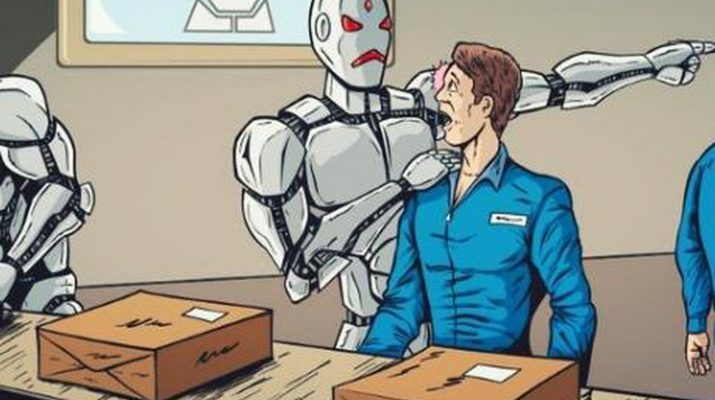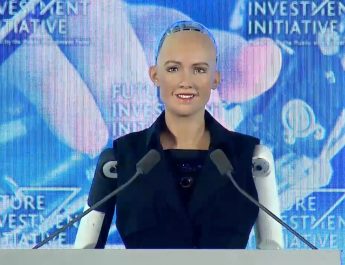IBM HR Director Diane Gherson says that over the next three years, 120 million workers will need retraining as artificial intelligence continues to take jobs.
Artificial intelligence is obviously ready to get started. Over the next three years, about 120 million workers from the 12 largest economies in the world may need to undergo retraining due to advances in artificial intelligence and intelligent automation, according to a study published on Friday by the IBM Institute of Business Value. However, less than half of the CEOs surveyed by IBM said they had the resources needed to bridge the skills gap caused by these new technologies.
Concerns about how AI successes will affect work are not new. Tesla and SpaceX CEO Elon Musk said last month that AI could make many jobs “pointless”. In one report earlier this year, it was discovered that robots could replace people with a quarter of US jobs by 2030.
IBM says companies should be able to bridge the skill gap needed for the AI era, but that won’t be easy. The company said global studies show that over the past four years, the time required to bridge the gap in employee qualifications has grown by more than 10 times. This is partly due to rapidly emerging demands for new skills, while other skills are becoming obsolete.
IBM: 120 million workers will need retraining due to robots.
IBM SKILLS GAP SURVEY
120 million people will need retraining in next 3 years
This as Artificial Intelligence and automation transform workforce
It now takes 36 days to retrain, compared to 3 in 2014





Luckily I don’t need any reskilling, already have lots of hobbies and interests, to spend my endless holidays that the total automation will bring
These people are so …….useless they never had jobs to begin with.
the high regulated close job markets and sectors will feel the most impact and destruction.
omg the AI is coming for our jobs! that’s why unemployment is at a 50 year low and more people are in the workforce than ever before in human history.
So far AI can solve the problems, which can be brute forced (machine translation) or problems with well defined unbreakable rules (Go, Chess).
People are needed when both of the constraints are not present.
Interesting perspective. Me on my side, most of the business owners I’ve have had the opportunity to interact with in France told me that they were disappointed by ML and AI; the increase in productivity was a lot less than expected. Also, a lot of jobs couldn’t be fully automated. You still have thousands of financial analysts in banks reading excel spreadsheets all day long.
Jobs are still there, but the issue is that they don’t pay as much as before (or we under employ them) and we don’t WANT to change our current, unsustainable consumption levels: 120.000$ for a degree, a huge house in the suburbs, state-of-the-art healthcare with hotel-like service in hospitals, ect ect. Politicians who have bold visions for the future get evicted from office because they offer too much change to the taste of most of the population.
No one needs a brick-and-mortar education anymore with the advent of e-learning platforms like EdX, their own private room when they are hospitalized, we could as well live in a smaller apartment and take public transportation when going to work…
the solution lies in translating post-scarcity economic theories into pragmatic policies. So far the politics of dealing with this is slow.
I am interacting every day with Ai systems to build Ai systems and IMHO, the biggest problem is all about the people who get not hired because machines have made the job pointless. My current Ai system replaces a financial analyst, or two, and I think that trend keeps going for quite some time.
For example, in the next five years alone, 4 million robots are expected to run warehouses. The topic is less obvious because firing a lot of people makes headlines, however, not hiring them, well, is barely noticed by anyone. So it happened that Amazon, for example, silently rolls out more robots and more sophisticated robots that handle even more advanced task.
When the next economic downturn kicks in, the problem will inevitably become plainly obvious b/c the economic pressure will inevitably accelerate automation rollout to drive cost down.
What do you believe will reskilling (warehouse) workers do relative to the job losses through automation? Becoming underpaid Uber driver just to get replaced by self-driving cars? Is that the solution?
Unless society faces the reality of the ongoing oblivious job-loss through not hiring people driven by advanced automation, there is no point even discussing the future of work.
The real problem comes down to creating entirely new industries enabled by advanced technologies in which a lot of people find employment. Space exploration or even mining in outer space, as crazy as it sounds, is one avenue. Another one would be ecological restoration. There are very big challenges out there, but few have bold visions to address them and even less have the balls to solve them.
We cannot undo the progress already made through technology, but we can use the very same technology to invent new industries to create the future of work we need.
https://www.cnbc.com/…/citi-mark-may-amazon-relies-on…
https://www.supplychaindive.com/…/Amazon…/554642/
https://www.supplychaindive.com/…/robots…/551418/
Logistically impossible. And over the following three years, another 200 million. We cannot educate our way out of this.
except if we reform teaching methods and our education system
big gov has an impact on this
He is right
this is so obviously wrong
y’all are dumb as hell for believing this
Interesting…also the machines buy goods? If economy wont consumers what Will BE the future that PRODUCTION?
Every industrial revolutions create new type of jobs and eliminate outdated ones. Who can survive who can adapt.
AI and robotic automation will take most of manual and configurable tasks currently taken care by humen. This is global impact . None will be spared if they are reluctant to up skill.
I am going to add a degree of shitiness – how about loosing your job as a call center asociate to an AI startup firm that pools IT labor from India or other foreing nation?
Decentralized AI marketplaces will make most human functionality worthless. Unless we start augmenting with physical hardware, humans need not apply in any way.
Not gonna happen. Implement UBI and let people sort it out themselves by starting companies and investing in their communities.
About 10percent, maybe, are Entrepreneurs. The majority make the machine work.
Yeah, but will they do it for the men? Or will they just do it for the women because – feminism.
Aaron Aurochs, I feel like this is your own projection of what you believe rather than reality
???
Let the robots by all the plastic shit
You’ve seen what 2 million looked like in Hong Kong recently. But 120 million is just asking for a revolution.
The fantasy writers would like you to think so – but the engineers in the trenches actually creating the technology have a VERY different opinion.
Lol.. even the best AI today is still idiotic stupid .. If-then-else still have some road to cover .. machine learning is getting better..
No link to the study in the article. No specific jobs predicted to be replaced. No credibility.
Many jobs carried out by humans today are very mechanistic and can be replaced with simple scripts. I’m aware of a number of large UK companies (clients of my last employer) that have eliminated many hundreds of administrative positions and replaced them with “Robotic Process Automation”. Doesn’t actually need to be AI, just scripts that follow simple, defined business processes. This is a real thing, even if this particular article isn’t credible.